About Cyber Apocalypse 2023
Just like for the previous editions, this year I took part in Cyber Apocalypse 2023 CTF (check the link for more info). Briefly explained, a Capture-The-Flag competition consists in a series of challenges that contestants need to solve in order to find a hidden flag that will grant points to their team.
Sadly, I could only work on the puzzles during the weekend, but nontheless I had a ton of fun and managed to solve my fair share of challenges. Here’s the index of my writeup:
- Misc:
- Hardware:
- Reversing:
- Pwn:
MISC 1: Persistence
The provided IP address returned each time a different random short string, so I just kept reading its output until the substring “HTB” matched.
import requests, re
for i in range(1000):
t = requests.get('http://.../flag').text.strip()
print("Req#%04d: %s" % (i, t))
if re.match(r'HTB.+', t):
print(t)
break
Output:
...
Req#0492: {u!w&~[jiS=_XOU!IX+3]\@g4*mK
Req#0493: 1p4|TE@>RT>c:5?qg8gHdu]
Req#0494: O?MOR=ke:n}f}5H}|HtS/t6ZbA[d6v+
...
Req#0509: A0<0L.T%E\L$%O(c$.BAF5u^Tc>K"/
Req#0510: rf_4$f<aQvJh*$&ods%_I\
Req#0511: HTB{y0u_h4v3_p0w3rfuL_sCr1pt1ng_ab1lit13S!}
HTB{y0u_h4v3_p0w3rfuL_sCr1pt1ng_ab1lit13S!}
MISC 2: Remote Computation
This task consisted in solving 500 expressions to be read from a remote IP, with a couple of rules like decimal format and some error messages to rise in specific conditions.
import re
from pwn import *
r = remote(...)
r.recvuntil(b'> ')
r.sendline(b'1')
for i in range(500):
resp = r.recvline_regexS('\[[0-9]+\].+')
print("Response:", resp)
exp = re.findall(r'\[[0-9]{3}\]: (.+) = \?', resp)[0]
try:
res = eval(exp)
print(exp, ' ==> ', res)
if res >= -1337 and res <= 1337:
r.sendline(("%.2f" % res).encode('utf-8'))
else:
r.sendline("MEM_ERR")
except ZeroDivisionError:
r.sendline("DIV0_ERR")
except SyntaxError:
r.sendline("SYNTAX_ERR")
print()
print(r.recvall())
Output:
$ python misc4.py
[+] Opening connection to xxx: Done
Response: [001]: 13 / 27 + 30 - 16 + 26 + 19 + 15 * 16 + 18 + 8 + 30 - 21 - 21 / 15 + 11 = ?
13 / 27 + 30 - 16 + 26 + 19 + 15 * 16 + 18 + 8 + 30 - 21 - 21 / 15 + 11 ==> 344.0814814814815
Response: > [002]: 28 - 4 + 30 / 22 * 29 - 27 - 15 * 9 + 4 = ?
28 - 4 + 30 / 22 * 29 - 27 - 15 * 9 + 4 ==> -94.45454545454547
Response: > [003]: 28 / 6 - 13 + 15 / 20 / 27 / 0 * 21 * 24 * 20 = ?
28 / 6 - 13 + 15 / 20 / 27 / 0 * 21 * 24 * 20 ==> DIV0_ERR
...
Response: > [498]: 11 - 16 - 10 + 24 / 4 = ?
11 - 16 - 10 + 24 / 4 ==> -9.0
Response: > [499]: 18 / 2 * 4 + 20 * 20 + 3 + 7 - 17 - 6 - 21 - 5 * 21 = ?
18 / 2 * 4 + 20 * 20 + 3 + 7 - 17 - 6 - 21 - 5 * 21 ==> 297.0
Response: > [500]: 17 - 29 * 29 + 20 + 14 - 9 - 15 * 17 = ?
17 - 29 * 29 + 20 + 14 - 9 - 15 * 17 ==> -1054
[+] Receiving all data: Done (47B)
[*] Closed connection to xxx
b'> [*] Good job! HTB{d1v1d3_bY_Z3r0_3rr0r}'
Hardware 2: Critical Flight
To solve this challenge, it was sufficient to open the Gerber files in KiCAD ad the two copper layers revealed the shape of the flag split in two substrings:
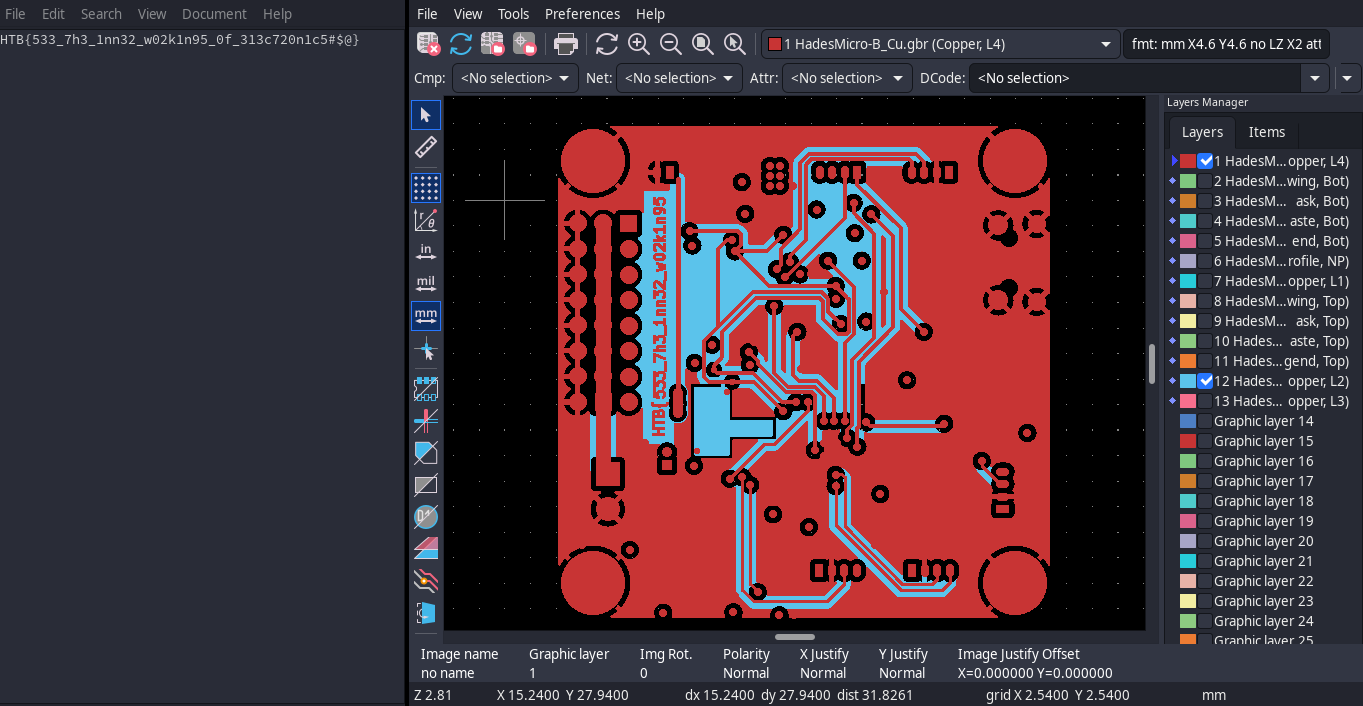
Hardware 3: Debug
The provided file was a .sal archive, i.e. a logic analizer session. Opening it with SALEAE’s Logic 2 revealed an async UART stream. Decoding it as ASCII characters returned a textual boot log.
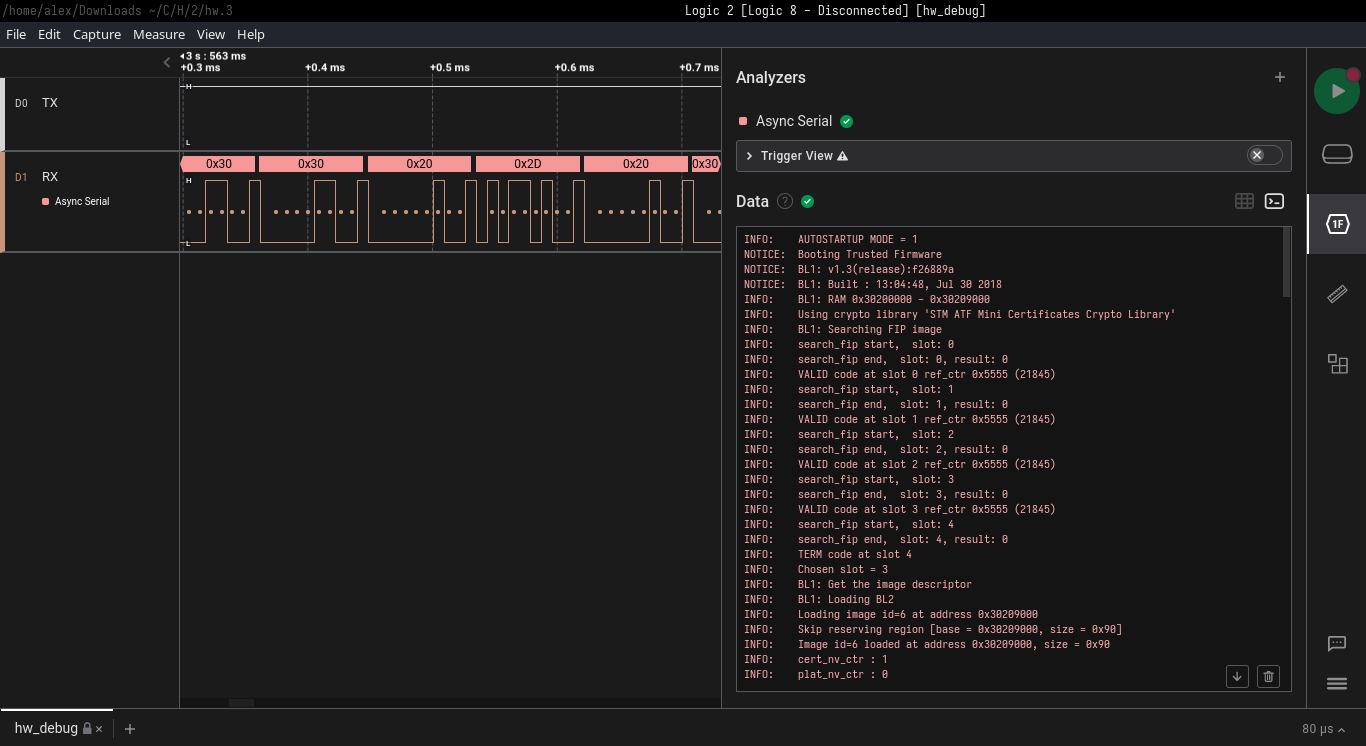
Hidden among all the text, was the flag split in pieces:
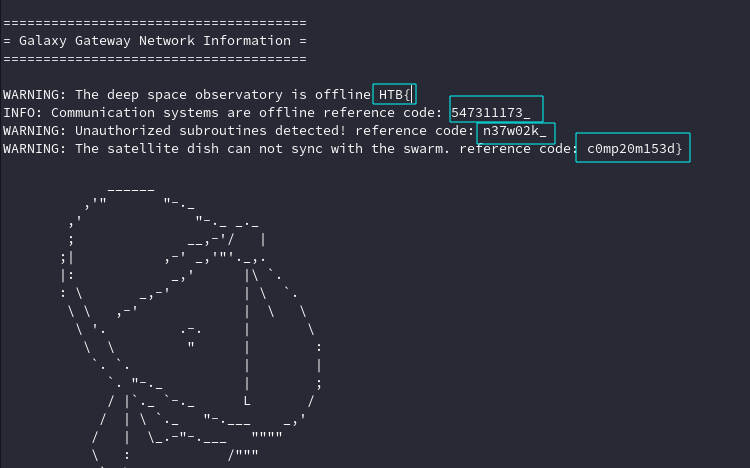
Hardware 4: Secret Codes
This time, the provided files were another .sal archive and a set of Gerber files. The Logic 2 session contained 8 channels that looked like this:
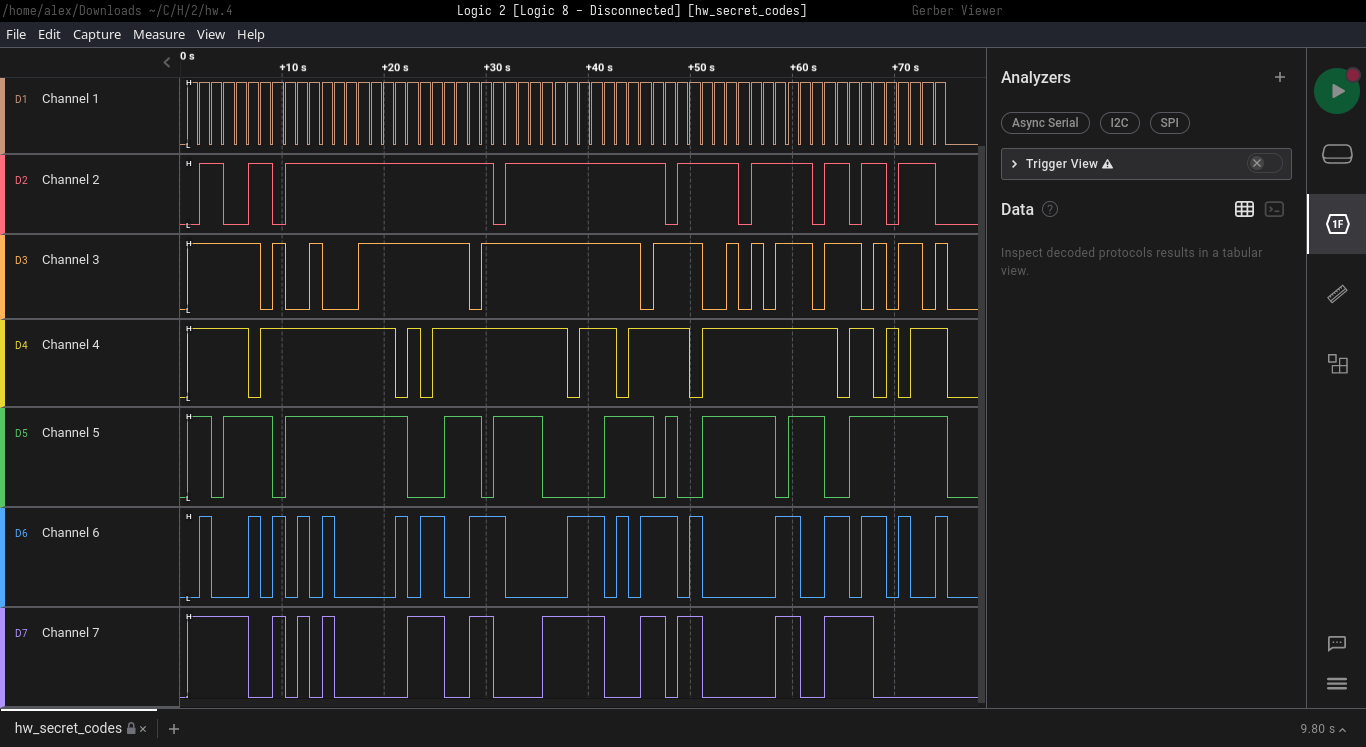
While the Gerber archive contaianed this weird PCB with a 7-segment display in the center of an Eye of Horus:
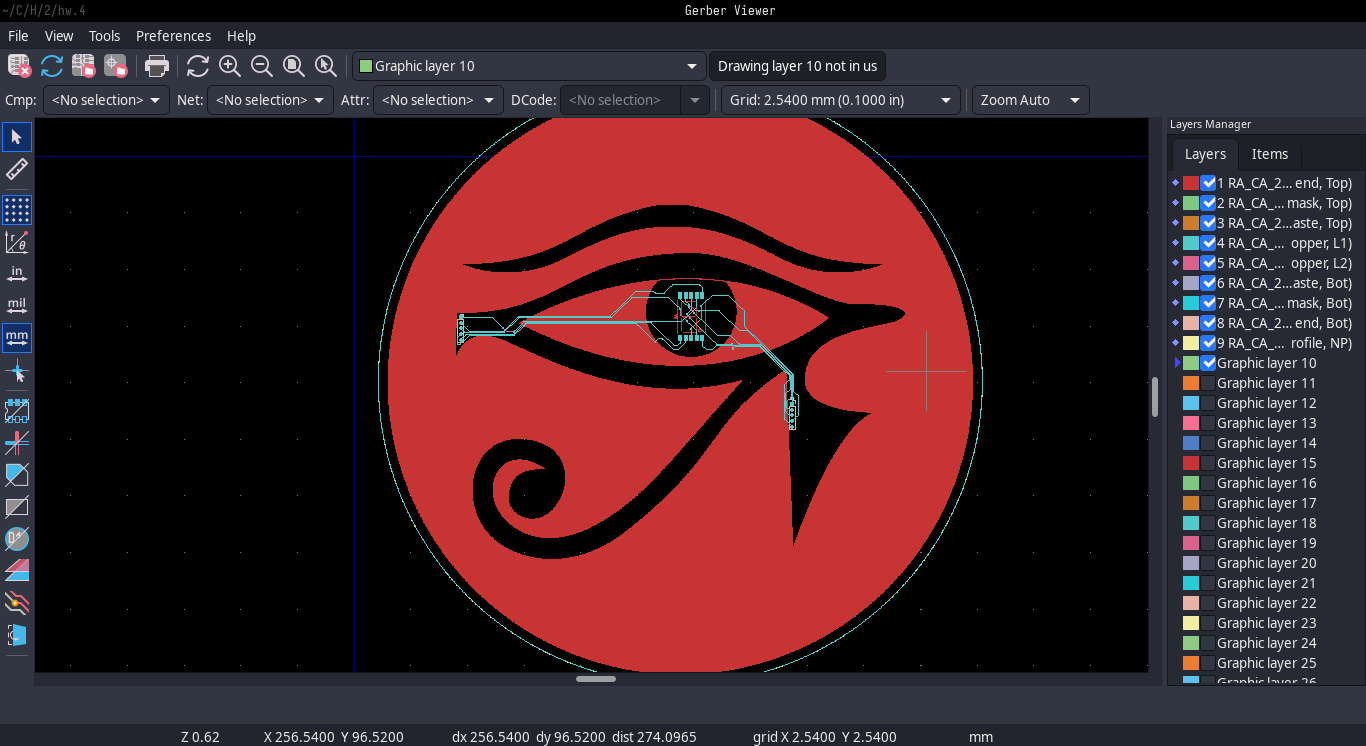
The first thing I did was exporting the digital channels into a CSV that I could parse with Python, hopefully finding a sequence of displayed digits that meant something. After realizing that channel 1 was a “clock” signal, I struggled quite some time trying to understand how the other channels mapped to the seven segments of the display. Trial and error didn’t help much, but at one point I discovered that the upmost Gerber layer had some engravings near the connectors that indicated the correct mapping between channels and PCB traces.
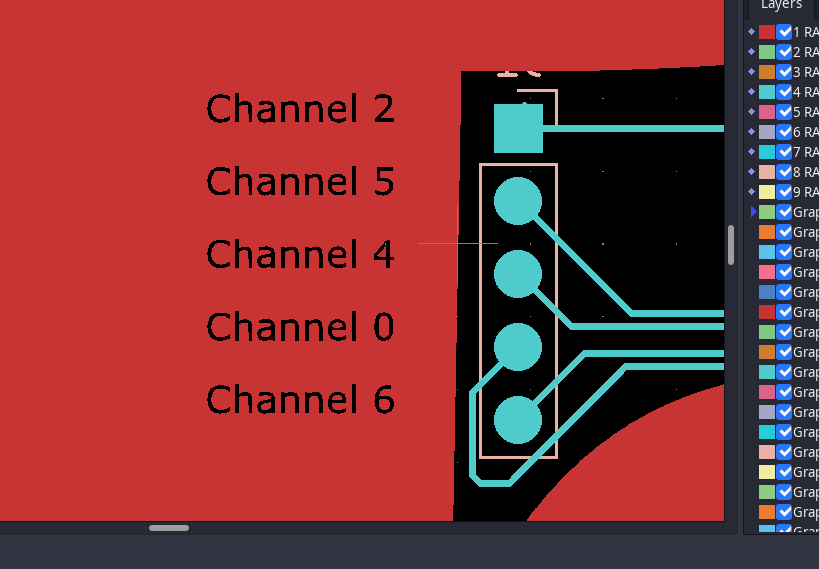
At this point, however, I was still missing the mapping between display pins and segments, so I assumed it had the typical pinout of a common-cathode chip, that is:
[3] [7] [-] [2] [5]
__|___|___|___|___|__
| g f x a b |
| |
~ ~ ~ ~ ~ ~ ~ ~ ~ ~ ~
~ ~ ~ ~ ~ ~ ~ ~ ~ ~ ~
| |
|_e___d___x___c___._|
| | | | |
[6] [0] [-] [4] [1]
I wrote a script to parse the CSV dump into HEX characters, decoded them, and got the flag:
input = [l.strip().split(',') for l in open('digital.csv').readlines()][1:]
map = {
'1111110': '0',
'0110000': '1',
'1101101': '2',
'1111001': '3',
'0110011': '4',
'1011011': '5',
'1011111': '6',
'1110000': '7',
'1111111': '8',
'1111011': '9',
'': 'A',
'0011111': 'B',
'': 'C',
'0111101': 'D',
'1001111': 'E',
'1000111': 'F',
}
message = ''
for line in input:
l = line[1:]
clk = l[1]
# Signals order:
# 01234567
# d.agcbef
code = ''
for i in [2, 5, 4, 0, 6, 7, 3]:
code += l[i]
if clk == '1':
message += map[code]
print(message)
print(binascii.unhexlify(message))

Reversing 1: Shattered Tablet
We get a binary that propts Hmmmm... I think the tablet says:. Decompiling the executable reveals a big if statement:
undefined8 main(void) {
undefined8 local_48;
undefined8 local_40;
undefined8 local_38;
undefined8 local_30;
undefined8 local_28;
undefined8 local_20;
undefined8 local_18;
undefined8 local_10;
local_48 = 0;
local_40 = 0;
local_38 = 0;
local_30 = 0;
local_28 = 0;
local_20 = 0;
local_18 = 0;
local_10 = 0;
printf("Hmmmm... I think the tablet says: ");
fgets((char *)&local_48,0x40,stdin);
if (((((((((local_30._7_1_ == 'p') && (local_48._1_1_ == 'T')) && (local_48._7_1_ == 'k')) &&
((local_28._4_1_ == 'd' && (local_40._3_1_ == '4')))) &&
((local_38._4_1_ == 'e' && ((local_40._2_1_ == '_' && ((char)local_48 == 'H')))))) &&
(local_28._2_1_ == 'r')) &&
((((local_28._3_1_ == '3' && (local_30._1_1_ == '_')) && (local_48._2_1_ == 'B')) &&
(((local_30._5_1_ == 'r' && (local_48._3_1_ == '{')) &&
((local_30._2_1_ == 'b' && ((local_48._5_1_ == 'r' && (local_40._5_1_ == '4')))))))))) &&
(((local_30._6_1_ == '3' &&
(((local_38._3_1_ == 'v' && (local_40._4_1_ == 'p')) && (local_28._1_1_ == '1')))) &&
(((local_30._3_1_ == '3' && (local_38._1_1_ == 'n')) &&
(((local_48._4_1_ == 'b' && (((char)local_28 == '4' && (local_40._1_1_ == 'n')))) &&
((char)local_38 == ',')))))))) &&
((((((((char)local_40 == '3' && (local_48._6_1_ == '0')) && (local_38._7_1_ == 't')) &&
((local_40._7_1_ == 't' && ((char)local_30 == '0')))) &&
((local_40._6_1_ == 'r' && ((local_28._5_1_ == '}' && (local_38._5_1_ == 'r')))))) &&
(local_38._6_1_ == '_')) && ((local_38._2_1_ == '3' && (local_30._4_1_ == '_')))))) {
puts("Yes! That\'s right!");
}
else {
puts("No... not that");
}
return 0;
}
To reverse it, I created a Python script that worked directly on the Assembly instructions for simplicity:
asm = '''
001011c6 0f b6 45 df MOVZX EAX,byte ptr [RBP + local_30+0x7]
001011ca 3c 70 CMP AL,0x70
001011cc 0f 85 8e JNZ LAB_00101360
01 00 00
001011d2 0f b6 45 c1 MOVZX EAX,byte ptr [RBP + local_48+0x1]
001011d6 3c 54 CMP AL,0x54
001011d8 0f 85 82 JNZ LAB_00101360
01 00 00
001011de 0f b6 45 c7 MOVZX EAX,byte ptr [RBP + local_48+0x7]
001011e2 3c 6b CMP AL,0x6b
001011e4 0f 85 76 JNZ LAB_00101360
01 00 00
001011ea 0f b6 45 e4 MOVZX EAX,byte ptr [RBP + local_28+0x4]
001011ee 3c 64 CMP AL,0x64
001011f0 0f 85 6a JNZ LAB_00101360
01 00 00
001011f6 0f b6 45 cb MOVZX EAX,byte ptr [RBP + local_40+0x3]
001011fa 3c 34 CMP AL,0x34
001011fc 0f 85 5e JNZ LAB_00101360
01 00 00
00101202 0f b6 45 d4 MOVZX EAX,byte ptr [RBP + local_38+0x4]
00101206 3c 65 CMP AL,0x65
00101208 0f 85 52 JNZ LAB_00101360
01 00 00
0010120e 0f b6 45 ca MOVZX EAX,byte ptr [RBP + local_40+0x2]
00101212 3c 5f CMP AL,0x5f
00101214 0f 85 46 JNZ LAB_00101360
01 00 00
0010121a 0f b6 45 c0 MOVZX EAX,byte ptr [RBP + local_48]
0010121e 3c 48 CMP AL,0x48
00101220 0f 85 3a JNZ LAB_00101360
01 00 00
00101226 0f b6 45 e2 MOVZX EAX,byte ptr [RBP + local_28+0x2]
0010122a 3c 72 CMP AL,0x72
0010122c 0f 85 2e JNZ LAB_00101360
01 00 00
00101232 0f b6 45 e3 MOVZX EAX,byte ptr [RBP + local_28+0x3]
00101236 3c 33 CMP AL,0x33
00101238 0f 85 22 JNZ LAB_00101360
01 00 00
0010123e 0f b6 45 d9 MOVZX EAX,byte ptr [RBP + local_30+0x1]
00101242 3c 5f CMP AL,0x5f
00101244 0f 85 16 JNZ LAB_00101360
01 00 00
0010124a 0f b6 45 c2 MOVZX EAX,byte ptr [RBP + local_48+0x2]
0010124e 3c 42 CMP AL,0x42
00101250 0f 85 0a JNZ LAB_00101360
01 00 00
00101256 0f b6 45 dd MOVZX EAX,byte ptr [RBP + local_30+0x5]
0010125a 3c 72 CMP AL,0x72
0010125c 0f 85 fe JNZ LAB_00101360
00 00 00
00101262 0f b6 45 c3 MOVZX EAX,byte ptr [RBP + local_48+0x3]
00101266 3c 7b CMP AL,0x7b
00101268 0f 85 f2 JNZ LAB_00101360
00 00 00
0010126e 0f b6 45 da MOVZX EAX,byte ptr [RBP + local_30+0x2]
00101272 3c 62 CMP AL,0x62
00101274 0f 85 e6 JNZ LAB_00101360
00 00 00
0010127a 0f b6 45 c5 MOVZX EAX,byte ptr [RBP + local_48+0x5]
0010127e 3c 72 CMP AL,0x72
00101280 0f 85 da JNZ LAB_00101360
00 00 00
00101286 0f b6 45 cd MOVZX EAX,byte ptr [RBP + local_40+0x5]
0010128a 3c 34 CMP AL,0x34
0010128c 0f 85 ce JNZ LAB_00101360
00 00 00
00101292 0f b6 45 de MOVZX EAX,byte ptr [RBP + local_30+0x6]
00101296 3c 33 CMP AL,0x33
00101298 0f 85 c2 JNZ LAB_00101360
00 00 00
0010129e 0f b6 45 d3 MOVZX EAX,byte ptr [RBP + local_38+0x3]
001012a2 3c 76 CMP AL,0x76
001012a4 0f 85 b6 JNZ LAB_00101360
00 00 00
001012aa 0f b6 45 cc MOVZX EAX,byte ptr [RBP + local_40+0x4]
001012ae 3c 70 CMP AL,0x70
001012b0 0f 85 aa JNZ LAB_00101360
00 00 00
001012b6 0f b6 45 e1 MOVZX EAX,byte ptr [RBP + local_28+0x1]
001012ba 3c 31 CMP AL,0x31
001012bc 0f 85 9e JNZ LAB_00101360
00 00 00
001012c2 0f b6 45 db MOVZX EAX,byte ptr [RBP + local_30+0x3]
001012c6 3c 33 CMP AL,0x33
001012c8 0f 85 92 JNZ LAB_00101360
00 00 00
001012ce 0f b6 45 d1 MOVZX EAX,byte ptr [RBP + local_38+0x1]
001012d2 3c 6e CMP AL,0x6e
001012d4 0f 85 86 JNZ LAB_00101360
00 00 00
001012da 0f b6 45 c4 MOVZX EAX,byte ptr [RBP + local_48+0x4]
001012de 3c 62 CMP AL,0x62
001012e0 75 7e JNZ LAB_00101360
001012e2 0f b6 45 e0 MOVZX EAX,byte ptr [RBP + local_28]
001012e6 3c 34 CMP AL,0x34
001012e8 75 76 JNZ LAB_00101360
001012ea 0f b6 45 c9 MOVZX EAX,byte ptr [RBP + local_40+0x1]
001012ee 3c 6e CMP AL,0x6e
001012f0 75 6e JNZ LAB_00101360
001012f2 0f b6 45 d0 MOVZX EAX,byte ptr [RBP + local_38]
001012f6 3c 2c CMP AL,0x2c
001012f8 75 66 JNZ LAB_00101360
001012fa 0f b6 45 c8 MOVZX EAX,byte ptr [RBP + local_40]
001012fe 3c 33 CMP AL,0x33
00101300 75 5e JNZ LAB_00101360
00101302 0f b6 45 c6 MOVZX EAX,byte ptr [RBP + local_48+0x6]
00101306 3c 30 CMP AL,0x30
00101308 75 56 JNZ LAB_00101360
0010130a 0f b6 45 d7 MOVZX EAX,byte ptr [RBP + local_38+0x7]
0010130e 3c 74 CMP AL,0x74
00101310 75 4e JNZ LAB_00101360
00101312 0f b6 45 cf MOVZX EAX,byte ptr [RBP + local_40+0x7]
00101316 3c 74 CMP AL,0x74
00101318 75 46 JNZ LAB_00101360
0010131a 0f b6 45 d8 MOVZX EAX,byte ptr [RBP + local_30]
0010131e 3c 30 CMP AL,0x30
00101320 75 3e JNZ LAB_00101360
00101322 0f b6 45 ce MOVZX EAX,byte ptr [RBP + local_40+0x6]
00101326 3c 72 CMP AL,0x72
00101328 75 36 JNZ LAB_00101360
0010132a 0f b6 45 e5 MOVZX EAX,byte ptr [RBP + local_28+0x5]
0010132e 3c 7d CMP AL,0x7d
00101330 75 2e JNZ LAB_00101360
00101332 0f b6 45 d5 MOVZX EAX,byte ptr [RBP + local_38+0x5]
00101336 3c 72 CMP AL,0x72
00101338 75 26 JNZ LAB_00101360
0010133a 0f b6 45 d6 MOVZX EAX,byte ptr [RBP + local_38+0x6]
0010133e 3c 5f CMP AL,0x5f
00101340 75 1e JNZ LAB_00101360
00101342 0f b6 45 d2 MOVZX EAX,byte ptr [RBP + local_38+0x2]
00101346 3c 33 CMP AL,0x33
00101348 75 16 JNZ LAB_00101360
0010134a 0f b6 45 dc MOVZX EAX,byte ptr [RBP + local_30+0x4]
0010134e 3c 5f CMP AL,0x5f
'''
import re, binascii
mem = {
'local_28': [0]*6,
'local_30': [0]*8,
'local_38': [0]*8,
'local_40': [0]*8,
'local_48': [0]*8
}
asm = [l.strip() for l in asm.split('\n')]
for i in range(len(asm)):
line = asm[i]
if 'MOVZX' in line:
addr, off = re.findall(r'\[RBP \+ (local_..)\+?(.+)?\]', line)[0]
off = int(off, 16) if off else 0
i += 1
line = asm[i]
letter = re.findall(r'AL,0x(.+)', line)[0]
mem[addr][off] = letter
i += 1
for k in sorted(mem.keys(), reverse=True):
hex = ''.join(mem[k])
print(binascii.unhexlify(hex).decode('utf-8'), end='')
print()
Which yields the input that the binary expects, i.e., our flag:
HTB{br0k3n_4p4rt,n3ver_t0_b3_r3p41r3d}
Reversing 2: She Shells C Shells
This challenge gives us a shell with a few commands available:
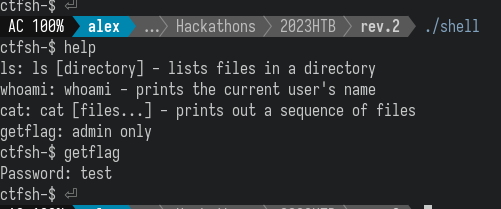
The command that interests us is of course getflag, which however requires a password. Decompiling the binary reveals this interesting function that is called with that command:
undefined8 func_flag(void) {
undefined8 uVar1;
// ...
undefined8 local_20;
int local_14;
uint i, j;
printf("Password: ");
user_password = 0;
local_110 = 0;
// ...
local_20 = 0;
fgets((char*)&user_password, 0x100, stdin);
for (i = 0; i < 0x4d; i = i + 1) {
*(byte*)(&user_password + i) = *(byte*)(&user_password + i) ^ m1[i];
}
local_14 = memcmp(&user_password,t,0x4d);
if (local_14 == 0) {
for (j = 0; j < 0x4d; j = j + 1) {
*(byte*)(&user_password + j) = *(byte*)(&user_password + j) ^ m2[j];
}
printf("Flag: %s\n",&user_password);
uVar1 = 0;
}
else {
uVar1 = 0xffffffff;
}
return uVar1;
}
Therefore, the password needs to be a string that when XORed with m1 matches the t array. We can find this string by XORing m1 and t:
asm_m = '''001021a0 6e undefin 6Eh [0] XREF[2]: func_flag:00101908(*),
001021a1 3f undefin 3Fh [1]
001021a2 c3 undefin C3h [2]
...
001021ea a8 undefin A8h [74]
001021eb 7e undefin 7Eh [75]
001021ec 8d undefin 8Dh [76] '''
asm_t = '''00102200 2c undefin 2Ch [0] XREF[1]: func_flag:0010193b(*)
00102201 4a undefin 4Ah [1]
00102202 b7 undefin B7h [2]
...
0010224a c9 undefin C9h [74]
0010224b 10 undefin 10h [75]
0010224c e9 undefin E9h [76] '''
import re, binascii
psw = ''
asm_m, asm_t = asm_m.splitlines(), asm_t.splitlines()
for i in range(len(asm_m)):
m = re.findall(r' (..)h ', asm_m[i])[0]
t = re.findall(r' (..)h ', asm_t[i])[0]
psw += chr(ord(binascii.unhexlify(m)) ^ ord(binascii.unhexlify(t)))
print(psw)
This yields the password that the program expects and we get the flag:
$ ./shell
ctfsh-$ getflag
Password: But the value of these shells will fall, due to the laws of supply and demand
Flag: HTB{cr4ck1ng_0p3n_sh3ll5_by_th3_s34_sh0r3}
ctfsh-$
Reversing 3: Needle in a Haystack
We have a script that returns a random word from a dictionary each time it is invoked.
$ strings haystack | grep HTB
HTB{d1v1ng_1nt0_th3_d4tab4nk5}
Reversing 4: Hunting License
We connect to the provided IP address with nc and we get a type of quiz. I answered to the first questions using the file utility, ldd, and Ghidra; for the passwords, see below.
$ nc xxx yy
What is the file format of the executable?
> ELF
[+] Correct!
What is the CPU architecture of the executable?
> x86-64
[+] Correct!
What library is used to read lines for user answers? (`ldd` may help)
> libreadline
[+] Correct!
What is the address of the `main` function?
> 0x401172
[+] Correct!
How many calls to `puts` are there in `main`? (using a decompiler may help)
> 5
[+] Correct!
What is the first password?
> PasswordNumeroUno
[+] Correct!
What is the reversed form of the second password?
> 0wTdr0wss4P
[+] Correct!
What is the real second password?
> P4ssw0rdTw0
[+] Correct!
What is the XOR key used to encode the third password?
> \x13222\x7fr}zUw}Rwaz{G
[-] Wrong Answer.
What is the XOR key used to encode the third password?
> 0x13
[+] Correct!
What is the third password?
> ThirdAndFinal!!!
[+] Correct!
[+] Here is the flag: `HTB{l1c3ns3_4cquir3d-hunt1ng_t1m3!}`
The first password is in plain text:
void exam(void) {
int iVar1;
undefined8 local_38;
undefined8 local_30;
undefined local_28;
undefined8 local_1c;
undefined4 local_14;
char *user_input;
user_input = (char*)readline("Okay, first, a warmup - what\'s the first password? This one\'s not even hidden: ");
iVar1 = strcmp(user_input,"PasswordNumeroUno");
if (iVar1 != 0) {
puts("Not even close!");
exit(-1);
}
free(user_input);
local_1c = 0;
local_14 = 0;
reverse(&local_1c, t, 0xb);
user_input = (char*)readline("Getting harder - what\'s the second password? ");
iVar1 = strcmp(user_input, (char*)&local_1c);
if (iVar1 != 0) {
puts("You\'ve got it all backwards...");
exit(-1);
}
free(user_input);
local_38 = 0;
local_30 = 0;
local_28 = 0;
xor(&local_38, t2, 0x11, 0x13);
user_input = (char*)readline("Your final test - give me the third, and most protected, password: ");
iVar1 = strcmp(user_input, (char*)&local_38);
if (iVar1 != 0) {
puts("Failed at the final hurdle!");
exit(-1);
}
free(user_input);
return;
}
The second password is the reversed contents of vector t:
t XREF[3]: Entry Point(*),
00404060 30 undefin 30h [0] XREF[3]: Entry Point(*),
00404061 77 undefin 77h [1]
00404062 54 undefin 54h [2]
00404063 64 undefin 64h [3]
00404064 72 undefin 72h [4]
00404065 30 undefin 30h [5]
00404066 77 undefin 77h [6]
00404067 73 undefin 73h [7]
00404068 73 undefin 73h [8]
00404069 34 undefin 34h [9]
0040406a 50 undefin 50h [10]
0040406b 00 undefin 00h [11]
307754647230777373345000
0wTdr0wss4P
>>> binascii.unhexlify('3077546472307773733450')[::-1]
P4ssw0rdTw0
For the third password we need to examine the xor function that is being called:
void xor(long result, long s1, ulong len, byte s2) {
int i;
for (i = 0; (ulong)(long)i < len; i = i + 1) {
*(byte *)(result + i) = *(byte *)(s1 + i) ^ s2;
}
return;
}
Which tells us that our password needs to match t2 XOR’ed with 0x13:
t2 XREF[3]: Entry Point(*),
00404070 47 undefin 47h [0] XREF[3]: Entry Point(*),
00404071 7b undefin 7Bh [1]
00404072 7a undefin 7Ah [2]
00404073 61 undefin 61h [3]
00404074 77 undefin 77h [4]
00404075 52 undefin 52h [5]
00404076 7d undefin 7Dh [6]
00404077 77 undefin 77h [7]
00404078 55 undefin 55h [8]
00404079 7a undefin 7Ah [9]
0040407a 7d undefin 7Dh [10]
0040407b 72 undefin 72h [11]
0040407c 7f undefin 7Fh [12]
0040407d 32 undefin 32h [13]
0040407e 32 undefin 32h [14]
0040407f 32 undefin 32h [15]
00404080 13 undefin 13h [16]
t2 = '477B7A6177527D77557A7D727F32323213'
>>> ''.join(chr(b^0x13) for b in binascii.unhexlify(t2))
'ThirdAndFinal!!!\x00'
PWN 3: Getting Started
This challenge is essentially an interactive, guided buffer overflow attack:
nc xxxx yy
Stack frame layout
| . | <- Higher addresses
| . |
|_____________|
| | <- 64 bytes
| Return addr |
|_____________|
| | <- 56 bytes
| RBP |
|_____________|
| | <- 48 bytes
| target |
|_____________|
| | <- 40 bytes
| alignment |
|_____________|
| | <- 32 bytes
| Buffer[31] |
|_____________|
| . |
| . |
|_____________|
| |
| Buffer[0] |
|_____________| <- Lower addresses
[Addr] | [Value]
-------------------+-------------------
0x00007ffe41ed0a50 | 0x0000000000000000 <- Start of buffer
0x00007ffe41ed0a58 | 0x0000000000000000
0x00007ffe41ed0a60 | 0x0000000000000000
0x00007ffe41ed0a68 | 0x0000000000000000
0x00007ffe41ed0a70 | 0x6969696969696969 <- Dummy value for alignment
0x00007ffe41ed0a78 | 0x00000000deadbeef <- Target to change
0x00007ffe41ed0a80 | 0x0000559c16f7c800 <- Saved rbp
0x00007ffe41ed0a88 | 0x00007f861b330c87 <- Saved return address
0x00007ffe41ed0a90 | 0x0000000000000001
0x00007ffe41ed0a98 | 0x00007ffe41ed0b68
// [...]
◉◉◉◉◉◉◉◉◉◉◉◉◉◉◉◉◉◉◉◉◉◉◉◉◉◉◉◉◉◉◉◉◉◉◉◉◉◉◉◉◉◉◉◉◉◉◉◉◉◉◉◉◉◉◉◉◉◉◉◉◉◉◉◉◉◉◉◉◉◉◉◉◉◉◉◉◉◉◉◉◉◉◉◉◉◉◉◉◉◉◉◉◉◉◉◉◉◉◉
◉ ◉
◉ Fill the 32-byte buffer, overwrite the alginment address and the "target's" 0xdeadbeef value. ◉
◉ ◉
◉◉◉◉◉◉◉◉◉◉◉◉◉◉◉◉◉◉◉◉◉◉◉◉◉◉◉◉◉◉◉◉◉◉◉◉◉◉◉◉◉◉◉◉◉◉◉◉◉◉◉◉◉◉◉◉◉◉◉◉◉◉◉◉◉◉◉◉◉◉◉◉◉◉◉◉◉◉◉◉◉◉◉◉◉◉◉◉◉◉◉◉◉◉◉◉◉◉◉
>> aaaaaaaaaaaaaaaaaaaaaaaaaaaaaaaaaaaaaaaaaaaa
[Addr] | [Value]
-------------------+-------------------
0x00007ffe41ed0a50 | 0x6161616161616161 <- Start of buffer
0x00007ffe41ed0a58 | 0x6161616161616161
0x00007ffe41ed0a60 | 0x6161616161616161
0x00007ffe41ed0a68 | 0x6161616161616161
0x00007ffe41ed0a70 | 0x6161616161616161 <- Dummy value for alignment
0x00007ffe41ed0a78 | 0x0000000061616161 <- Target to change
0x00007ffe41ed0a80 | 0x0000559c16f7c800 <- Saved rbp
0x00007ffe41ed0a88 | 0x00007f861b330c87 <- Saved return address
0x00007ffe41ed0a90 | 0x0000000000000001
0x00007ffe41ed0a98 | 0x00007ffe41ed0b68
HTB{b0f_s33m5_3z_r1ght?}